Kelly Lee Owens – daydreamer of the year
From Soho to Venice and back again
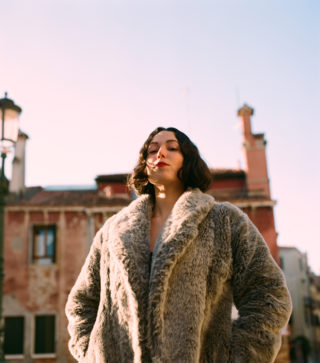
From Soho to Venice and back again
Kelly Lee Owens arrived in Venice on a speed boat at sunset, wearing a fake fur coat and sunglasses. “DJs get treated the best,” she tells me at lunch the following day – a lunch laid on by Set Up: a site-specific program of music and performing arts that Kelly will close this evening, in an empty art gallery at the southern peninsular of the Grand Canal that dissects Venice in two with a backwards S.
“I’ve had an idea for the photos,” she says while we wait for our food, and describes her black velvet dress with wide sleeves and gold beading, and the bridges she could stand on – “if you’re up for something a bit dramatic? … Not that I want to tell you what to do… I mean, we can do whatever. Or try it and see how it goes?” I soon realise that this type of enthusiasm and consideration is typical of Owens. A little later in the day, when I ask her what time she’s on tonight, she says: “12:45, but seriously, you don’t have to come if you don’t want to.”
Like anyone who’s never seen Venice before, we spend the afternoon walking along the canals in awe and repeatedly calling the place ridiculous, because it is – a jewel of a city built in 400 AD in the middle of the sea, on an inverted forest of 10 million trees driven into the silt of the shallows. Venice doesn’t sound or look real, especially at night when it feels like an abandoned Hollywood studio lot. Every building looks too perfectly aged, with muted colours and fading paintwork made just so by a contrived Disneyland set designer. From whatever angle you look at the place it feels 2D, and like you could push it over.
As we go, Kelly eagerly tells me about her star sign. She’s a Virgo, which means she’s obsessed with details and precision, and that she’s modest, which stacks up when, as we duck down one narrow street, she insists that she’s not a top DJ, despite what tonight’s booking suggests. “The reason someone like Peggy [Gou] is so good, is because that’s what she’s doing all the time,” she says. “She’s brilliant – in record stores, finding music, every day. But that’s not what I want to be doing – I’m most interested in creating my own music.”
We attempt to cross the Grand Canal in a water taxi, fail, and end up on the same side we started.
At 5pm, as we walk to the venue for Kelly’s line-check, one of Venice’s 139 churches begins to toll. Up ahead with our photographer Jonangelo, she runs back, grabs her phone from her handbag and bolts back towards the clock tower, recording the bells in her voice memos with an outstretched arm. Her manager Clarisse tells me that she’s always doing things like this. “You never know,” says Kelly, “there might be a sample in that.”
When we get to the Punta della Dogana museum, housed in a low-slung 17th Century customs building, Kelly sizes it up as the festival organiser gives her a tour. “This is going to have a good sound,” she says of the main room, and she was right.
I note how modest her rider is compared to other artists with their own areas in the green room. Behind the screen with Kelly Lee Owens written on it is a couple of bottles of red wine and some kombucha. “It’s because my voice is so important to me,” she says. “Anyone can do all the twiddling and mixing, but my voice is what I want to connect with, and even though this is a DJ set, I’m going to try to open with [the Howie’s version of Björk’s] ‘All Is Full Of Love’ and sing on it, because you never see a DJ do that. I’ll never take my voice for granted.”
When the show rolls around, Kelly keeps her 60 minutes of techno punchy. She crunches one track to a pulp and watches the room blow up when she releases it. She’s almost out of the door when the stage manager runs after her to ask if she’ll do an encore. Her speedboat picks her up at 10am the following morning.
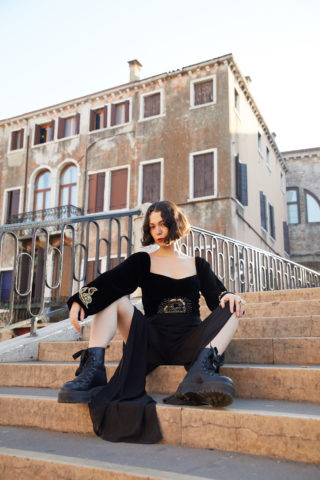
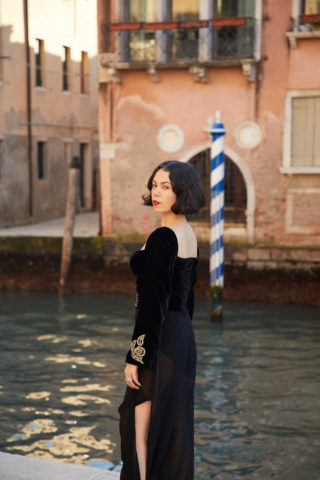
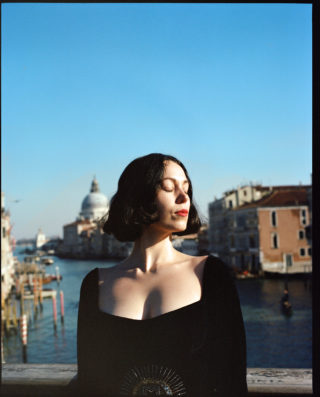
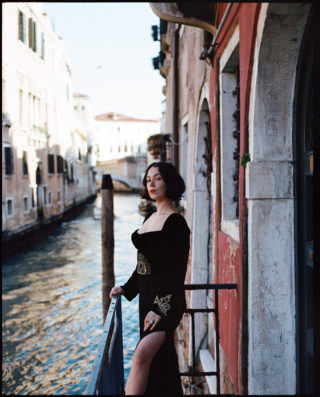
“Do I look crazy? Because I was properly crying,” says Kelly a week later in a coffee shop in Soho. An hour ago she heard via Twitter that her friend – DJ, producer, remixer and dance music pioneer Andrew Weatherall – had died. She raises her coffee and toasts him, and remembers a man who never copped off with the business side of the music industry, who never needed to feign interest in aspiring young musicians, even having achieved all that he had. “He was on the level with everyone,” she says. “‘Oh hi, what’s your name? What are you up to? That’s really great.’ He was always interested in other people.”
Kelly first met Weatherall ten years ago whilst working at the now defunct record store Pure Groove – “the key to it all”. Jobs in other record stores played their part too, including Selectadisc, on the same street we’re currently drinking coffee on.
“Between here and Bar Italia [a few streets away and immortalised in Pulp’s song of the same name, ‘Where other broken people go’] I’d go and dream about making music. It was before I even worked in the record store. You know Bombay Bicycle Club – me and Jack [Steadman] used to hang out a lot and he’d DJ around Soho, and we’d go to Bar Italia at 3 in the morning and get a bagel and play on the fruit machines, and jump into locked parks in central London. Dip into a gay bar. It felt like our playground, moving to London from a village in rural Wales.”
On a Tuesday night, at the old burlesque bar Madame Jojo’s, at Soho’s most indie of indie nights ever, White Heat, Kelly would knock back the £2.50 shorts feeling completely at home. As a kid she’d been obsessed with Oasis; by her late teens she was helping Foals, The Maccabees and Friendly Fires sell their merch, driving Yannis and Jimmy from the former band to shows in her green Ford Ka. “It was a fucking bass bin!” she says. “Massive speakers in each door, and the round, cavernous pea on wheels.” Some years later, whilst working at the Rough Trade record store, she met Graham Coxon, exchanged details, “and he kind of became my mentor. When I was playing in a band he gave me a Mustang bass to play on tour, and I was like, ‘ah, I sort of cut myself and squirted some blood on it,’ and he was like, ‘great! It needs a bit of scuffing up.’ He really helped me, and he helped me in leaving the band, giving me good advice. He even signed off my American visa, so he’s a good, good man.”
What strikes me about Kelly today, who has sat front row at London Fashion Week since I last saw her, as a new name in minimal techno and ambient pop, is how her “indie-ness” goes beyond the bands she used to obsess over and drink with, and runs deeper into the way she gets things done. “DIY is my vibe and always will be,” she tells me, saying of her decision to press her first two singles to 12” herself was because, “I’m very much a doer. I keep doing shit until stuff happens.” So when she finishes telling me about Graham Coxon, saying, “this brings me back to how amazing record stores are for meeting people,” I don’t even clock Kelly’s modesty – it’s not as if Coxon mentors every record store worker he meets.
“But then SchneidersLaden came to Rough Trade from Berlin, with all the synths.” The German electronics store, specialising in modular synths, sound processors and sequencers, set up a concession in Rough Trade East for around a year. “I’d be able to go in there and just patch things and try things,” says Kelly. “And that was when I was like, ‘oh, the synth thing is physical.’ And I just felt connected, because before I felt disconnected, even though I was working opposite Fabric at Pure Groove. I was a Welsh girl coming from the indie, melodic, melancholic thing; the crossover for me was The Knife – like, ‘Oh god, I’m into dance music.’ I liked the rounded, warm sounds, and slowly techno and dance music got me.”
She had back-up at Pure Groove too, working alongside a pre-Drone Logic Daniel Avery (a record on which Kelly would appear), and James Greenwood aka Ghost Culture, who engineered Kelly’s 2017 debut as well as her forthcoming album, Inner Song.
Kelly was now feeling Arthur Russell so much that she wanted one of her own in her live band. She advertised for a cellist on Gumtree and got a response from a guy called Doug who wasn’t one but knew one. For six months, at a cost that is mathematically impossible, she fronted a synth player, her own Arthur Russell and James Greenwood on electronic drums. “That was my indie-ness coming through,” she says, “Like, ‘I’ll just front this.’ But what I started to realise was that people started to genuinely presume that I was just the singer. And I’m really sorry to report that even now, having just done this track with Jon Hopkins [‘Luminous Spaces’], that’s still the case whenever my voice is on a track.
“It was my label boss, Joakim, who said to me, ‘PJ Harvey in the ’90s, when she stood there with a single guitar and just her, was one of the most powerful things I’ve seen – why don’t you just do that yourself?’.”
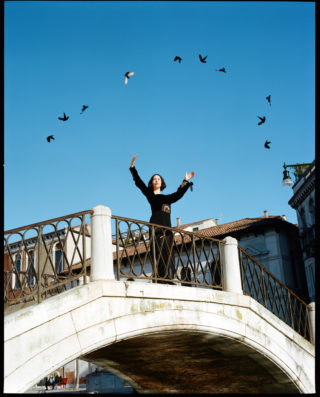
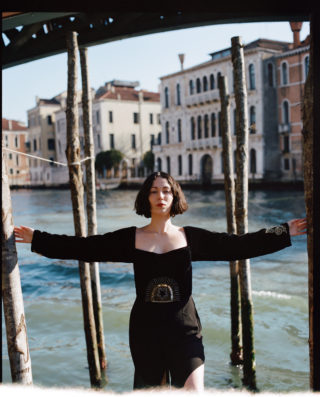
In Venice, we only briefly talked about Kelly’s new album, when she told me that there’s no grand plan behind it, naturally avoiding how good it is. If she sees Inner Song as the natural evolution of her self-titled debut from three years ago, though, it’s no bad thing, especially for the many who fell so hard for it.
It’s a record that once again divides its time between the throb of wordless techno tracks and down tempo dream pop numbers, with myriad of other influences thrown in to both. ‘On’ pulls off each style one after the other, when Kelly’s breathy vocal drops out over the blips, the pace quickens and switches to a low-end thump for the next two and a half minutes. A similar tone – of warmth and smoothness – permeates the whole album, regardless of any given track’s leading style: like the thudding ‘Melt!’, which features perfectly weighted drops, and Kelly’s clearest venture into vintage Krautrock – ‘Jeanette’.
By grounding everything in the bass, Inner Song is tied together with a richness that perhaps goes all the way back to when Kelly first heard The Knife. There’s a murky RnB slow jam, too (‘Re-Wild’), some old-school two-step at the end of the otherwise meditative ‘Arpeggi’, and John Cale collaborates on ‘Corner of My Sky’ – something that, as a proud, Welsh indie nut, Kelly still can’t quite believe: “I cried when I finished the arrangement,” she says.
The most marked difference is that Inner Song is sounding less dub than Kelly Lee Owens, which is a side effect of Kelly’s most direct decision when making this record: where her first album treated her voice as just another musical instrument, feeding her vocals through a Space Echo or Watkins Copicat, Inner Song lifts her voice to the front of the songs she sings on. “I supported Four Tet in America, and when Kieran saw me live he came over and said, ‘why have you been hiding your vocals? Get them up there next time.’
“But this record is also a reflection of my life. I’ve been through quite a lot in my personal life. It sounds clearer because that’s how I feel.”
It doesn’t take two listens to Inner Song to identify much of it as a break-up album. Kelly is, after all, singing hooks like, “So, this is how it must go / In my way / Moving on”, and ‘L.I.N.E.’ stands for ‘Love Is Not Enough’.
“What I’ve decided is to not divulge too many of the details,” she says, “especially when there’s another person involved. But the album focuses on a lot of loss. What I’ve realised is that even in the deepest and darkest of times – and this is cheesy – is that sense of hope. There’s always something hopeful in my music. It’s the melancholic Welsh girl thing. Again, I can’t help it. I’ve tried to write something in a major key and I just can’t do it.
“I’ll let the lyrics do the talking, but there are many, many losses. And because of these other losses there’s this loss of self. There have been moments during these last few years when I didn’t know any longer who I was or what I wanted. I couldn’t really function.”
I ask if that includes her questioning whether she doubted being an artist anymore.
“Oh yes,” she says. “I was so affected, physically, by these traumatic situations that happened to me that my body was telling me no, and I’d be in bed for a week. And I had to cancel shows because I lost my voice three times. I wasn’t coping well, and I think your body is the last thing to give up. The most gutting points for me was when I had to cancel Green Man, because that was going to be like coming home for me. I’ve been working a lot on boundary stuff, and personal health – and I think we all need to be working on that. It’s this big topic right now because we’re living in this crazy society. It’s unsustainable.” She points to the opening lyric of ‘Wake Up’, Inner Song’s closing track: “Losing our minds for the short term gain / Short term everything”.
“Everything is on speed right now,” she says. “Of course, I come up with a lyric and I see myself in it. That’s me – I wake up and I’m swiping on Instagram, when I’m at my most vulnerable, just awake, when all these thoughts are coming in. We wake up and are between worlds, and we let all of this information in.
“That’s a commentary on human connection – “Swipe to the next frame / Swipe to the next face / Another new fate”. Y’know, depending on what way you swipe, your whole life changes, and it terrifies me. I’ve never been on a dating app, and I just can’t. I feel like if I can’t meet someone in real life, I’ll happily die a cat lady. I’ve come to that decision. I’m going to become like Enya and live in a castle with all my gay friends and cats. I’m good with that. I’ll keep making music in my castle for health spas.”
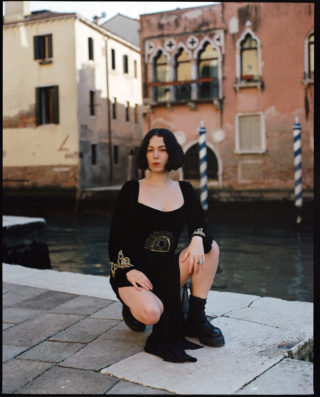
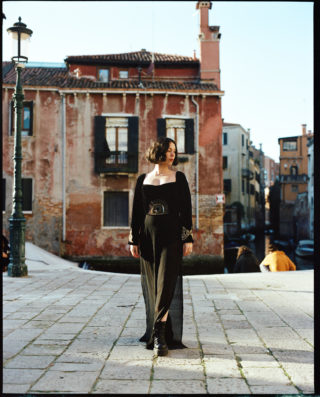
When she was a kid, Kelly had two horses, not because she was rich but because where she lived in north Wales people would pass them around for free because they’re expensive to keep – “‘Do you want this horse?’ ‘Yeah, sure.’”
She sang in a choir when she wasn’t singing in front of the mirror. Friends would knock to ask if she was coming out, but she was busy recording the top 40 and harmonising over the cassettes.
“Virgo is a loner and I relate to that,” she says. “I spend a lot of time by myself, because I need to recharge. When I was a kid I was outgoing and a loner, in a way. I got the Daydreamer of the Year award in school, and Music Lover of the Year, and I felt understood for the first time. Like, this is me. I will never get an accolade as high as Daydreamer of the Year award. As far as they were concerned it was a laugh, but I was like, ‘yes, they get me.’”
She says that she’s happy completely on her own or in the role of social butterfly, “but people don’t understand that, and think you’re false.” There’s a song on Inner Song that speaks to that, and the sense of hope that threads through Kelly’s melancholic music. ‘Night’ slowly builds to a mantra of, “It feels so good to be alone”, until it kicks on at the drop with, “…with you”.
But if we’re talking about earworms from the record, there’s a line in ‘L.I.N.E.’ that nags at me for days, where Kelly gently sings, “Death begins with compromise”. It’s inspired by a quote from American singer Eartha Kitt, who was laughing off and vehemently challenging a question about her having to compromise for a man. In the context of the song, it’s obviously not referring to literal death, although it’s a topic that follows Kelly around due to her previous work as an NHS cancer ward nurse.
“I could talk about death all day,” she says. “I feel it was a privilege to be there at the end of someone’s life, and it’s inevitable, so we need to be able to talk about this more. I genuinely believe that you can die well. The hearing is the last thing to go, so when my nana passed I was talking her through her death, and I would do that intuitively in the nursing home I worked at before the hospital and in the hospital. I would have days when I’d have stopped working for the day and someone’s dying and they’re alone, and I’d say, ‘I’m going to sit in that room with that man so that he doesn’t pass alone.’
“I’ve seen a lot,” she says. “The body is just a shell, and I’ve seen that essence disappear and go somewhere else.”
I suppose once you’ve cared for cancer patients in your late teens, moving to London to jump over fences into locked parks, keeping in touch with Graham Coxon and finding your own Arthur Russell only to let him go again aren’t such terrifying prospects. That Kelly’s done any of them is really quite incredible, even if Google does tell me that Virgos “take their responsibilities seriously”. It also says, “If you are ever unsure of how a Virgo feels, just look at their artwork.”
Before we go – so as not to end this on death (or a Google quote about horoscopes) – I ask Kelly when she hopes people will listen to Inner Song. Like its predecessor, it’s an album that will bang at her live shows, although to get a full sense of Kelly’s obsession with details and precision, the real treat comes when it’s piped directly into your ears.
“You should be looking up at the sky, on your back,” she says. “I’d encourage people to do more of that, period. Trust me, an afternoon or hour of that and your perspective on life is renewed.” Daydreamer of the year.